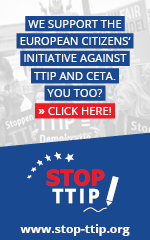| WHAT CAN YOU DO? |
|---|
|
Citizens in Europe are still resisting the last wave to privatize water, as a consequence of austerity measures imposed in several countries affected by the crisis. Attempts were blocked in Greece and are still being resisted in countries like Ireland. On the other hand, we have a new wave of cities taking back public control over water management, like Paris and Berlin. But those victories, and the huge effort to keep water public and enforce the human right to water in the European Union (EU), are facing now another major threat.
Next week, the eighth negotiation round of the Transatlantic Trade and Investment Partnership between the EU and the United States will take place in Brussels. This treaty, known as TTIP or TAFTA, is the most hyped of a new wave of free trade negotiations that pose a new menace for public water management. The EU has already finished the negotiations for a Comprehensive Economic and Trade Agreement (CETA) with Canada, and is currently negotiating the Trade in Services Agreement (TISA) among 50 countries.
The European Commission states that public services, including water, are not on the table, as they are going to include provisions to exclude them from the agreements. But given their track record of trying to force water privatization through previous trade agreements, concession contracts or the already mentioned austerity measures, we cannot just rest easy.
Trade negotiations are highly secretive, extremely complex and include many small details that can change the framework for running our public services. Risks might come from market access commitments, public procurement chapters or investment protection mechanisms, among many others. Even when provisions to keep water out of the negotiations are included, it is extremely hard to block all the possible damage.
Furthermore, these trade agreements, designed and promoted by big business, pose a threat not only to public water, but also to environmental protection or labour standards and many other civil society achievements over the last decades. There are campaigns against this new wave of trade agreements at both the European and national level. And keeping and recovering public water management are key reasons to engage in them.



